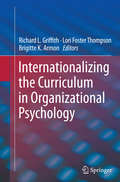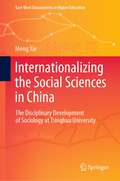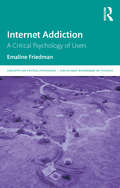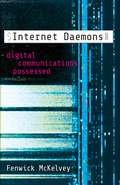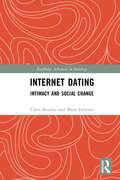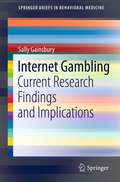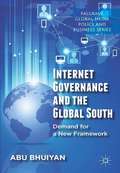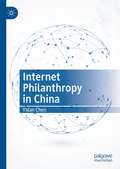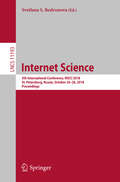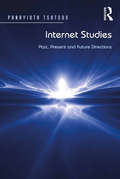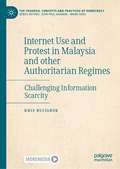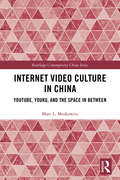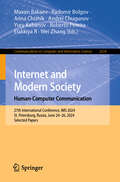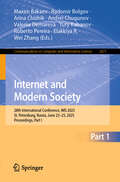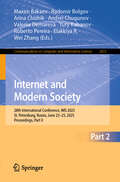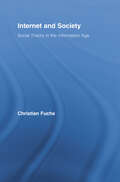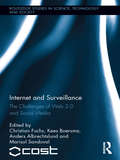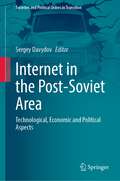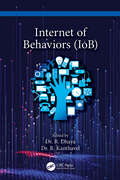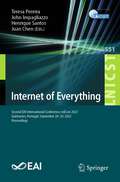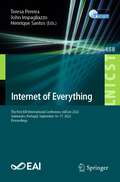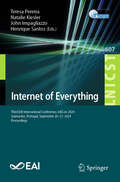- Table View
- List View
Internationalization and the Academic Profession: Comparative Perspectives (The Changing Academy – The Changing Academic Profession in International Comparative Perspective #24)
by Glen A. Jones Alper Çalıkoğlu Yangson KimThis book makes a major contribution to the scholarship on internationalization in higher education by focusing on the perceptions and experiences of the academic profession in a comparative perspective. Drawing from data collected by the Academic Professions in the Knowledge-based Society (APIKS) project, the contributors to this volume are uniquely positioned to explore the impact and implications of internationalization on those who play the central role in the teaching and research functions of higher education: the professoriate. The core chapters address issues such as the roles of gender, discipline, and career stage in the international activities of academics in different countries, national differences in the perceptions and behaviors of university faculty in the internationalization of teaching, and of research within higher education systems on the perceptions and behaviors of academics. Each of these chapters draw on the existing research literature in these thematic areas as a foundation for the systematic analysis of the international APIKS dataset to illuminate and discuss key findings. This book offers a highly original and unique contribution to the study of internationalization in higher education because its editors and contributors, as participants in the APIKS project, have been able to raise and address key research questions using comparative international empirical data on the academic profession that has never before been available. Given the tremendous importance of internationalization and the global dimension of higher education, this volume offers unique, distinctive insights on the implications of internationalization for the academic profession and the very different ways in which these transformations are understood by academics both within and between systems.
Internationalizing the Curriculum in Organizational Psychology
by Richard L. Griffith Lori Foster Thompson Brigitte K. ArmonThis book assembles state-of-the-art thinking on the internationalization of the curriculum of training centers in I/O and Work Psychology. The experts contributing chapters share their thoughts on the knowledge and skills that students must master in the 21st century, as well as their research on how we can develop students to be globally perceptive, culturally competent working professionals. Chapters cover a full range of topics such as: the scope of subject matter and content, learning objectives and outcomes, global competencies, co-curricular activities, experiential learning and the tacit curriculum, while curriculum development must stem from the philosophy of each institution, these philosophies may diverge in focus (e. g. science versus practice) and outcomes (e. g. jobs versus mastery). Therefore, the goal of the book is not to prescribe a particular curriculum, but rather to provide insight on possible curriculum elements that may be customized for use by training institutions.
Internationalizing the Psychology Curriculum in the United States
by Mark M. Leach Wade E. Pickren Frederick Leong Anthony J. MarsellaThe psychology community recognizes that cultivating an international worldview is crucial not only to professionals and researchers, but more importantly, for professors and students of psychology as well. It is critically necessary for psychologists to learn from their colleagues who are working in different cultural contexts in order to develop the type of knowledge and psychological understanding of human behavior that will be maximally useful to practitioners and researchers alike. This volume, Internationalizing the Psychology Curriculum in the United States, provides information and resources to help psychology faculty educate and train future generations of psychologists within a much more international mindset and global perspective. Recognizing that cultural context are central to a true and accurate psychology, the authors describes how cultural, economic, political, and social factors in different countries frame individual experience and affect the science and practice of psychology. Each of the chapters will provide a content-specific overview of how the curriculum in psychology with regards to social, development, clinical, counseling psychology, etc will need to be modified in order to present a much more global view of psychology.
Internationalizing the Social Sciences in China: The Disciplinary Development of Sociology at Tsinghua University (East-West Crosscurrents in Higher Education)
by Meng XieThe current social reality and changing global forces and spaces are inspiring the rethinking, refining, and re-empowering of the world social sciences to broach the frontiers of human knowledge, enhance mutual understanding across cultures and civilizations, and shape a better world. Taking Tsinghua University’s sociology as a case, this book concentrates on how internationalization shapes disciplinary development in a global context of asymmetrical academic relations. This inquiry is set amidst China’s dramatic economic, social, political, and cultural transformations, as well as the institutional reforms in this Chinese flagship university. This book seeks to probe how Chinese and Western knowledge, institutions, and cultures are integrated in the ongoing process of internationalization and concentrates on the disciplinary evolution of Tsinghua’s sociology—intellectually, institutionally, and culturally—drawing on top-down higher education policy and bottom-up perceptions and experiences of Tsinghua’s social scientists. This book highlights that higher education internationalization is an evolving process whose advanced phase would require Chinese social scientists to bring China to the world. It is time for Tsinghua University to reassess the long-term impact of internationalization on its academic disciplines and provide sufficient support for the development of the social sciences.This book will attract academics, practitioners, and postgraduate students interested in higher education internationalization, international academic relations, global constellation and distribution of academic power, academic knowledge production, and the development and intellectual influences of the Chinese social sciences.
Interne Organisationskommunikation und agile Rationalität: Ein systemtheoretisches Framing der agilen Organisation und ihrer internen Kommunikationen (Organisationskommunikation)
by Oliver HaidukiewiczSeit Ende der 90er-Jahre kursiert das Konzept der Agilität in der Organisationsforschung und versucht vor allem für Unternehmen zu eruieren, wie qua Schnelligkeit und Flexibilität der Unternehmensprozesse mit steigender Umweltvolatilität und -ambiguität umgegangen werden kann. Dominierend sind dabei managementorientierte Betrachtungen von Führung, Strategie, Kultur und vor allem Struktur. In sie werden in jüngerer Zeit zunehmend Vorstellungen einer internen, stationären Organisationskommunikation integriert, die klassisch-instrumenteller Natur sind und die das Konzept innerhalb der Organisation fördern, umsetzen und anleiten sollen. Wenig Beachtung finden hingegen aktuell noch kritische Stimmen zur Agilität, die einen Gegenpol zur ausschließlichen Befürwortung zweckorientierter Agilisierungen bilden. Die vorliegende Arbeit fragt zum einen danach, was passiert, wenn das spezifische Konzept der Agilität aus einem Management- und stark Akteurs-orientierten Betrachtungsrahmen herausgelöst und mit einer neuen, systemtheoretisch geprägten Organisationsauffassung nach Luhmann synthetisiert wird und eruiert zum anderen, was dies für Implikationen für die bisherigen Sichtweisen der internen Organisationskommunikation in Verbindung mit dem Konzept hat.
Internet Addiction: A Critical Psychology of Users (Concepts for Critical Psychology)
by Emaline FriedmanThis essential book questions the psychological construct of Internet Addiction by contextualizing it within the digital technological era. It proposes a critical psychology that investigates user subjectivity as a function of capitalism and imperialism, arguing against punitive models of digital excesses and critiquing the political economy of the Internet affecting all users. Friedman explores the limitations of individual-centered remediations exemplified in the psychology of internet addiction. Furthermore, Friedman outlines the self-creative actions of social media users, and the data processing that exploits them to urge psychologists to politicize rather than pathologize the effects of excessive net use. The book develops a notion of capitalist imperialism of the social web and studies this using the radical methods of philosopher Gilles Deleuze and psychoanalyst Félix Guattari. By synthesizing perspectives on digital life from sociology, economics, digital media theory, and technology studies for psychologists, this book will be of interest to academics and students in these areas, as well as psychologists and counselors interested in addressing Internet Addiction as a collective, societal ill.
Internet Daemons: Digital Communications Possessed (Electronic Mediations)
by Fenwick McKelveyA complete history and theory of internet daemons brings these little-known—but very consequential—programs into the spotlight We&’re used to talking about how tech giants like Google, Facebook, and Amazon rule the internet, but what about daemons? Ubiquitous programs that have colonized the Net&’s infrastructure—as well as the devices we use to access it—daemons are little known. Fenwick McKelvey weaves together history, theory, and policy to give a full account of where daemons come from and how they influence our lives—including their role in hot-button issues like network neutrality.Going back to Victorian times and the popular thought experiment Maxwell&’s Demon, McKelvey charts how daemons evolved from concept to reality, eventually blossoming into the pandaemonium of code-based creatures that today orchestrates our internet. Digging into real-life examples like sluggish connection speeds, Comcast&’s efforts to control peer-to-peer networking, and Pirate Bay&’s attempts to elude daemonic control (and skirt copyright), McKelvey shows how daemons have been central to the internet, greatly influencing everyday users.Internet Daemons asks important questions about how much control is being handed over to these automated, autonomous programs, and the consequences for transparency and oversight.
Internet Dating: Intimacy and Social Change (Routledge Advances in Sociology)
by Chris Beasley Mary HolmesInternet Dating deals primarily with the experiences of UK and Australian daters, examining their online accounts to see what kinds of narratives, norms, emotions and ‘chemistry’ shape their dating. Has the emergence and growth of internet dating changed the dating landscape for the better? Most commentators, popular and academic, ask whether online dating is more efficient for individuals than offline dating. We prefer a socio-political perspective. In particular, the book illustrates the extent to which internet dating can advance gender and sexual equality. Drawing on the voices of internet daters themselves, we show that internet dating reveals how social change often arises in the unassuming, everyday and familiar. We also pay attention to often ignored older daters and include consideration of daters in Africa, Scandinavia, South America, Asia and the Middle East. Throughout, we explore the pitfalls and pleasures of men and women daters navigating unconventional directions towards more equitable social relations.
Internet Gambling
by Sally GainsburyInternet gambling is one of the fastest growing forms of gambling. Global Internet gambling expenditure is predicted to reach US$33.6 billion in 2011. This is higher than worldwide movie box office revenues and represents 9% of the international gambling market. The rapid increase in expenditure of 354% since 2003 has occurred despite Internet gambling being prohibited in several key markets, including the US and China. It also suggests that current regulation may be somewhat outdated and ineffective as more and more people turn to this mode of gambling. Internet gambling is highly accessible with over 2,400 sites available 24/7 through computers, mobile phones, wireless devices and even interactive televisions. Gamblers can now play casino games, bingo, cards and poker, bet on races, sports and even celebrity weddings using over 199 means of electronic payments without leaving the house. Increasing international jurisdictions are legalizing Internet gambling and the constant accessibility of online gambling has critical social implications. Gambling operators are using aggressive advertising campaigns to move into new markets. Internet gambling appears to be particularly appealing to youth, who are gambling online at substantially higher rates than adults. Furthermore, Internet gambling appears to be related to problem gambling, with rates of problem gambling three to four times higher among Internet than non-Internet gamblers, indicating that it may have a substantial social cost. The anonymity of online sports betting poses a significant threat to the integrity of sport at all levels with increasing allegations of match-fixing and cheating. Estimates suggested that 50% of all bets on the 2010 FIFA World Cup were placed online, worth an estimated £500 million. These figures represent a 700% rise in online betting since the 2006 tournament and included many new players that opened online accounts. It is essential that appropriate responses are made by governments, industry professionals and the public in response to Internet gambling. This book will provide a comprehensive and up-to-date overview of Internet gambling, including the social impact and regulatory options. A global outline will include the characteristics and features of the many forms of Internet gambling, including the current market, and participation, and differences between Internet and non-Internet gambling. Specific regional considerations will be explored including regulatory responses and options. Importantly, the social consequences and costs of Internet gambling will be examined, including the impact of online gambling on sports, youth and problem gambling. Strategies for prevention and responsible gambling will be considered as well as expected trends.
Internet Governance and the Global South
by Abu BhuiyanA welcome addition to Palgrave's Global Media Policy and Business series, Internet Governance and the Global South documents the role of the global south in Internet policymaking and challenges the globalization theories that declared the death of the state in global decision-making. Abu Bhuiyan argues that the global Internet politics is primarily a conflict between the states - the United States of America and the states of the global south - because the former controls Internet policymaking. The states of the global south have been both oppositional and acquiescing to the sponsored policies of the United States on Internet issues such as digital divide, multilingualism, intellectual property rights and cyber security. They do not oppose the neoliberal underpinnings of the policies promoted by the United States, but ask for an international framework to govern the Internet so that they can work as equal partners in setting norms for the global Internet.
Internet Philanthropy in China
by Yidan ChenThis book is the work of Charles Chen Yidan, “the Father of China’s Internet Philanthropy”. It is based on the long-term research and practices of Tencent Research Institute and the Tencent Foundation. It reviews the recent history of internet-based charity during the past 20 years. It provides a first-time comprehensive review and study of internet-based charity from different dimensions, including the nature of internet-based charity, typical innovations and practices at home and abroad, as well as future prospects for integrating new technology and charity. It offers important insights into the transformation of many charitable organizations, the regulatory approach of governments towards these organizations, and the development of future society. This book contains not only a large set of the latest data from foreign countries but also exclusive interviews of many industry experts, including the directors of online charity platforms and chairmen of typical charitable organizations. It provides valuable references and is highly recommended for enterprises, organizations, and authorities that want to understand and promote the advancement of philanthropy in China.
Internet Science: 5th International Conference, INSCI 2018, St. Petersburg, Russia, October 24–26, 2018, Proceedings (Lecture Notes in Computer Science #11193)
by Svetlana S. BodrunovaThis book constitutes the proceedings of the 5th International Conference on Internet Science held in St. Petersburg, Russia, in October 2018. The 23 papers presented were carefully reviewed and selected for inclusion in this volume. They were organized in topical sections named: risks on the Internet: detecting harmful content and discussing regulation; methodologies for studies of online audiences; and online media and public issues.
Internet Studies: Past, Present and Future Directions
by Panayiota TsatsouThis book considers the lessons learnt so far from the emergence of the Internet and the development of the field of Internet studies, whilst also considering possible directions for the future. Examining broad media theories and emerging theorisations around the Internet specifically, it explores the possibility of the development of an Internet theory in the future. A comprehensive overview of the field, Internet Studies considers key issues of social importance that the study of the Internet draws upon, such as the role of the Internet in civic participation and democratisation, the development of virtual communities, digital divides and social inequality, as well as Internet governance and policy control. At the same time, it examines the role of the Internet in social research and the development of highly interdisciplinary and rapidly developing Internet research. Hence, this volume maps key areas of certainty and uncertainty in the field of Internet studies and, as such, it will be of interest to scholars and students of media and communication, sociology and social research methods.
Internet Use and Protest in Malaysia and other Authoritarian Regimes: Challenging Information Scarcity (The Theories, Concepts and Practices of Democracy)
by Kris RuijgrokThis book investigates the impact of internet use on anti-government protesting under authoritarian rule. By breaking up the causal chain into various steps, it provides a thorough and nuanced understanding of internet’s role in different stages of the mobilization process. It argues that the impact of internet use on anti-governmental protesting differs per step in the ‘mobilization chain’, and also that the effect depends on both the on- and offline repression of the regime, as well as on the type of internet that is available. While staying far away from any technologically deterministic claims about the internet, the book demonstrates that the internet especially plays an important role in the early stages of the mobilization process: By exposing citizens to alternative political information online, internet users are more likely to become sympathetic towards anti-governmental protest movements.
Internet Video Culture in China: YouTube, Youku, and the Space in Between (Routledge Contemporary China Series)
by Marc L MoskowitzExamining Internet culture in the People’s Republic of China, Taiwan, Hong Kong, and the US, this book analyzes videos which entertain both English and Chinese-speaking viewers to gain a better understanding of cultural similarities and differences. Each of the chapters in the volume studies streaming videos from YouTube and its Chinese counterparts, Todou and Youku, with the book using a combination of interpretative analysis of content, commentary, and ethnographic interviews. Employing a diverse range of examples, from Michael Jackson musical mash-ups of Cultural Revolution visuals, to short clips of Hitler ranting about twenty-first century issues with Chinese subtitles, this book goes on to explore the ways in which traditional beliefs regarding gender, romance, religion, and politics intersect. Looking at how these issues have changed over the years in response to new technologies and political economies, it also demonstrates how they engage in regional, transnational, and global dialogues. Comparing and incorporating the production of videos with traditional media, such as television and cinema, Internet Video Culture in China will be useful to students and scholars of Internet and digital anthropology, as well as Cultural Studies and Chinese Studies more generally.
Internet and Modern Society. Human-Computer Communication: 27th International Conference, IMS 2024, St. Petersburg, Russia, June 24–26, 2024, Selected Papers (Communications in Computer and Information Science #2534)
by Wei Zhang Radomir Bolgov Yury Kabanov Roberto Pereira Andrei Chugunov Maxim Bakaev Elakkiya R Anna ChizhikThis book constitutes the proceedings of the 27th International Conference on Internet and Modern Society, IMS 2024, held in St. Petersburg, Russia, in June 24–26, 2024. The 29 full papers presented in this book were carefully reviewed and selected from 75 submissions. They are categorized into the following topical sections: • Computational Linguistics (CompLing) • Interactive Systems & Information Society Technologies (InterSys)
Internet and Modern Society: 28th International Conference, IMS 2025, St. Petersburg, Russia, June 23–25, 2025, Proceedings, Part I (Communications in Computer and Information Science #2671)
by Wei Zhang Radomir Bolgov Yury Kabanov Roberto Pereira Andrei Chugunov Maxim Bakaev Elakkiya R. Anna Chizhik Valeriia DemarevaThis two-set volume CCIS 2671 and 2672 book constitutes the proceedings of the 28th International Conference on Internet and Modern Society, IMS 2025, held in St. Petersburg, Russia, during June 23–25, 2025. The 44 full papers and 12 short papers included in these conference proceedings were carefully reviewed and selected from 135 submissions. They are categorized into the following topical sections: Part I: Computational Linguistics & Machine Learning (CompLing); Cyberpsychology & Post-AI Education (PsyAI); Digital Transformation in Governance and Society (DTGS). Part II: Art and Innovation in Museums (AIMs); Interactive Systems & Information Society Technologies (InterSys).
Internet and Modern Society: 28th International Conference, IMS 2025, St. Petersburg, Russia, June 23–25, 2025, Proceedings, Part II (Communications in Computer and Information Science #2672)
by Wei Zhang Radomir Bolgov Yury Kabanov Roberto Pereira Andrei Chugunov Maxim Bakaev Elakkiya R. Anna Chizhik Valeriia DemarevaThis two-set volume CCIS 2671 and 2672 book constitutes the proceedings of the 28th International Conference on Internet and Modern Society, IMS 2025, held in St. Petersburg, Russia, during June 23–25, 2025. The 56 full papers and 12 short papers included in these conference proceedings were carefully reviewed and selected from 104 submissions. They are categorized into the following topical sections: Part I: Computational Linguistics & Machine Learning (CompLing); Cyberpsychology & Post-AI Education (PsyAI); Digital Transformation in Governance and Society (DTGS). Part II: Art and Innovation in Museums; Interactive Systems & Information Society Technologies; Interactive Systems and Technologies in Biomedicine and Psychology; Interactive Systems and Technologies in Education and Humanities
Internet and Society: Social Theory in the Information Age (Routledge Research in Information Technology and Society)
by Christian FuchsIn this exceptional study, Christian Fuchs discusses how the internet has transformed the lives of human beings and social relationships in contemporary society. By outlining a social theory of the internet and the information society, he demonstrates how the ecological, economic, political, and cultural systems of contemporary society have been transformed by new ICTs. Fuchs highlights how new forms of cooperation and competition are advanced and supported by the internet in subsystems of society and also discusses opportunities and risks of the information society.
Internet and Surveillance: The Challenges of Web 2.0 and Social Media (Routledge Studies in Science, Technology and Society)
by Christian Fuchs Kees Boersma Marisol Sandoval Anders AlbrechtslundThe Internet has been transformed in the past years from a system primarily oriented on information provision into a medium for communication and community-building. The notion of “Web 2.0”, social software, and social networking sites such as Facebook, Twitter and MySpace have emerged in this context. With such platforms comes the massive provision and storage of personal data that are systematically evaluated, marketed, and used for targeting users with advertising. In a world of global economic competition, economic crisis, and fear of terrorism after 9/11, both corporations and state institutions have a growing interest in accessing this personal data. Here, contributors explore this changing landscape by addressing topics such as commercial data collection by advertising, consumer sites and interactive media; self-disclosure in the social web; surveillance of file-sharers; privacy in the age of the internet; civil watch-surveillance on social networking sites; and networked interactive surveillance in transnational space. This book is a result of a research action launched by the intergovernmental network COST (European Cooperation in Science and Technology).
Internet in the Post-Soviet Area: Technological, Economic and Political Aspects (Societies and Political Orders in Transition)
by Sergey DavydovThis book offers a comparative perspective on the technological, economic, and political aspects of Internet development in the post-Soviet countries. In doing so, international experts analyze similarities and differences in various countries throughout the chapters.The volume consists of two parts. The chapters of the first part examine the post-Soviet area as a whole. The second part includes specific case studies on the development of the Internet, either in individual countries or in groups of countries. Countries analyzed are Estonia, Ukraine, Russia as well as three Central Asian countries: Kazakhstan, Uzbekistan and Tajikistan. Topics covered in the volume include, but are not limited to measurement, dynamics, and structure of each national Internet audience; the history of the Internet in the post-Soviet countries; development of infrastructure; Internet regulation and institutional aspects; online markets such as telecommunications, online advertising, e-commerce, and digital content; social and cultural aspects; as well as the transformation of the national media systems. This book is a must-read for students, researchers, and scholars of political science and economics, as well as policymakers and practitioners interested in a better understanding of Internet development in the post-Soviet area.
Internet of Behaviors (IoB)
by R. Kanthavel R. DhayaThis book is intended to survey the Internet of Behavior (IoB). The book begins with the benefits and potential pitfalls of IoB. Today, IoB has huge potential in every sector of the world. There are numerous applications for IoB which benefit users as well as the business market in order to enhance the user experience. In this book, the benefits of IoB and its negative constraints are discussed in detail. It is a high time that IoB is to take its crown and ruled the world. The work of IoB is critical in keeping our data secure because it can currently identify all humans who attempt to steal someone’s data. Moreover, the business uses of IoB are in high demand. By leveraging promising technical improvements and advances in machine learning algorithms, IoB enables capture, analysis, comprehension, and response for all types of human behavior in a technique that enables the tracking and interpretation of the behavior. IoB can be very useful wherever the behavior, preferences, interests, and location of people need to be examined. On the other hand, an analytical study on consumers’ social and behavioral psychology and their influence on online purchasing is much needed. With the help of visualization tools such as Tableau and detailed reporting on selection patterns, the impact of social media on decision making and the relationship between personality and purchasing power in various age groups is found. The presented study lists major decision-making psychometric factors and highlights critical factors affecting online purchases. The role of IoB is to shape customer service through the use of artificial intelligence, cloud computing, data, smart analytics, machine learning, and other volatile technologies. The attractive components of this book are discussions of dynamic routing mechanisms to reduce energy consumption in software-defined networks; deep insight into Internet of Things (IoT) and IoB security and privacy concerns – applications and future challenges; sentiment analysis and feature reduction using an arboreal monkey compression algorithm with a deep modified neural network classifier; cybersecurity concerns for IoB; and identification of nutrients and microbial contamination in fruits and vegetables using a technology using the Internet of Behavior. There is no doubt that this book covers numerous interesting themes and details on the Internet of Behavior.
Internet of Everything: Second EAI International Conference, IoECon 2023, Guimarães, Portugal, September 28-29, 2023, Proceedings (Lecture Notes of the Institute for Computer Sciences, Social Informatics and Telecommunications Engineering #551)
by Juan Chen John Impagliazzo Henrique Santos Teresa PereiraThis book constitutes the refereed post-conference proceedings of the Second International Conference on Internet of Everything, IoECon 2023, which took place in Guimarães, Portugal, in September 2023. IoECon 2023 presents IoT paradigms to their whole dimension, intelligently connecting devices, people, processes, data, and things. IoE is multi-disciplinary and offers an opportunity to explore the co-relations between different areas, techniques, and theories about a new cyber world. The 11 revised full papers were carefully reviewed and selected from 38 submissions. The papers focus on a complete ecosystem that digitally interconnects everything, including people-to-people, people to-machines, and machines-to-machines.
Internet of Everything: The First EAI International Conference, IoECon 2022, Guimarães, Portugal, September 16-17, 2022, Proceedings (Lecture Notes of the Institute for Computer Sciences, Social Informatics and Telecommunications Engineering #458)
by John Impagliazzo Henrique Santos Teresa PereiraThis book constitutes the refereed post-conference proceedings of the EAI International Conference on Internet of Everything, IoECon 2022, which took place in Guimarães, Portugal in September 16-17 2022. IoECon 2022 presents IoE paradigms to their whole dimension, intelligently connecting devices, people, processes, data, and things. IoE is multi-disciplinary and offers an opportunity to explore the co-relations between different areas, techniques, and theories about a new cyber world.The 10 revised full papers were carefully reviewed and selected from 26 submissions. The papers focus on a complete ecosystem that digitally interconnects everything, including people-to-people, people-to-machines, and machines-to-machines.
Internet of Everything: Third EAI International Conference, IoECon 2024, Guimarães, Portugal, September 26–27, 2024, Proceedings (Lecture Notes of the Institute for Computer Sciences, Social Informatics and Telecommunications Engineering #607)
by John Impagliazzo Henrique Santos Teresa Pereira Natalie KieslerThis book constitutes the refereed post-conference proceedings of the Third International Conference on Internet of Everything, IoECon 2024, which took place in Guimarães, Portugal, in September 26–27, 2024. The 10 full papers were carefully reviewed and selected from 28 submissions.The papers cover the following topics: Machine-to-Machine (M2M); People-to-Machine (P2M) or Machine-to-People (M2P).

